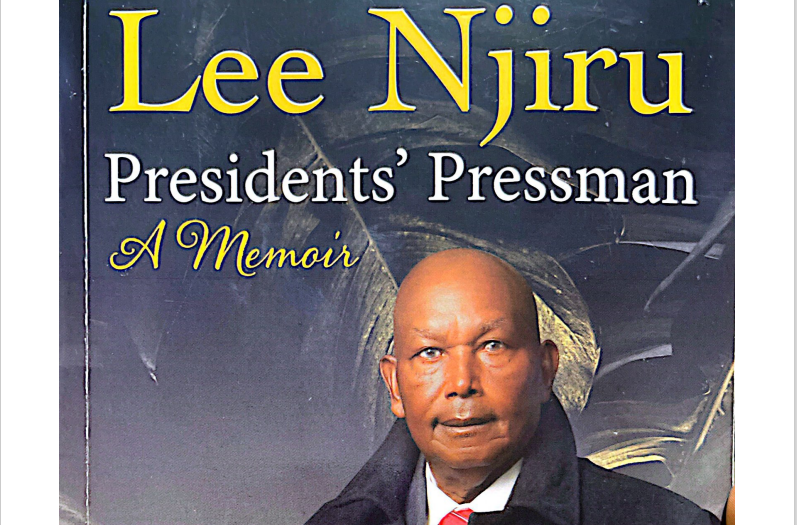Prime
The Presidents’ Pressman: A memoir.

Book cover: The Presidents’ Pressman: A memoir.
What you need to know:
- Book title: The Presidents’ Pressman: A memoir.
- Author: Lee Njiru
- Price: Shs80,000
- Publisher: Kenya Literature Bureau.
The life of any president is a beehive of activities. From running the government in normal times to taking life-and-death-decisions: when the country should go to war, when a war should end, and the daily politics of keeping office, meeting dignitaries et al.
When all is said and done, the presidency, in any country, is one hell of a unique office! Luckily for them, most presidents have several people at their disposal to help. For 43 years, Lee Njiru was one such person, serving not just one, but two Kenyan presidents as a pressman. This book explains the story of how he ended up in such a coveted position, what he saw, and his take on it all.
In his own words, Njiru did not imagine he would go far as a young boy. Of his humble beginning, he wrote, “I am a product of civil war, absence of paternal guidance, hunger, jiggers and bedbugs.” Yet, with an education received through thick and thin, dedication to his work, and – as he says through the book – the grace of God, Njiru was able to rise head and shoulders above the rest.
So, when a position fell vacant in the Presidential Press Unit (PPU) in 1974, a strong recommendation from those that knew him, for his work, was the parachute he needed for a soft landing on the job and President Jomo Kenyatta quickly appointed him after a brief – but intimidating – interview.
Njiru joined State House in the evening of President Jomo Kenyatta’s time as president, and on earth, so he served Kenya’s first president only until 1978.
Regardless, the four years were action packed. He writes about the politics of ethnicity that rocked the presidency then, the drinking and merrymaking, a powerful gang that surrounded the president and used their positions – and his name – as pass cards for their impunity. Soon age took its toll on the president and his physical and mental health status declined.
With time, public outbursts from the president became common, and his memory loss evident. On one occasion, Njiru writes that President Kenyatta’s Finance Minister, Mwai Kibaki, went see him in Mombasa and when the president was informed of the minister’s presence he asked, “Who is Mwai Kibaki?” to the shock of his aides. Constitutionally, it was illegal to discuss or imagine the death of a Kenyan president at the time.
However, the circumstances of the time made discussions on the topic inevitable, and set afoot plots and scheming by different groups, that Njiru says worked silently, behind closed doors, to bar the non-Kikuyu Vice President, Daniel Arap Moi from becoming the number one citizen. Njiru writes that he was part of the team side-lined, and marginalised at the time, partly because he was not a Kikuyu, despite hailing from “the mountains”, he was an Embu.
He watched on as the scheming happened, helpless, but hoping for the best for himself and the country – that the constitutional provision, in the event of a president’s death, be adhered to. In the end the anti-Moi team failed. Moi became president.
Moi retained, and eventually promoted Njiru to head Presidential Press Services (PPS) – the word “unit” was replaced with “service” due to the former word being largely connected to the military. It is the Moi presidency that Njiru worked for longest – when Moi retired in 2002, Njiru was one of the staff he went with to retirement, so, the book is largely on the Moi presidency and aftermath. Like most presidencies, especially those that rise after the fall of an adversary, in environments that were erstwhile hostile, Moi’s started with a purge. In some cases, resignation letters of resignation were written, and the unwanted officials asked to such them as their own.
The Moi presidency was a beehive, in the truest sense of that word. Njiru writes about trips they undertook abroad, controversies, his role in grooming Kenya’s future president, Uhuru Kenyatta, and ‘secret missions’ he undertook as assigned by the Kenya president and much more.
Regionally, he writes about the Moi presidency’s view of the conflict in Rwanda, the Sudan peace deals, and the peace talks between the then rebel Yoweri Kaguta Museveni and the Tito Okello Lutwa government in Kampala. In great detail, he talks about the tensions between Nairobi and Kampala in the early days of Museveni’s presidencies, and the rumours that were spread to create a narrative for monetary gains.
Njiru’s book is a well of wisdom, not just for Kenyans but the region as a whole. Anyone interested in the way politics is conducted at the top level in the region, the fears of our presidents, their day to day lives, and those around them, will like it. Great book.




